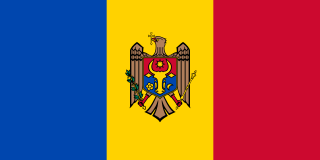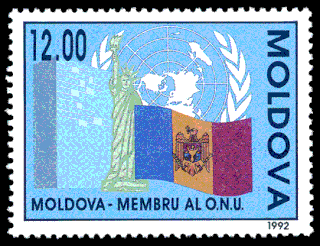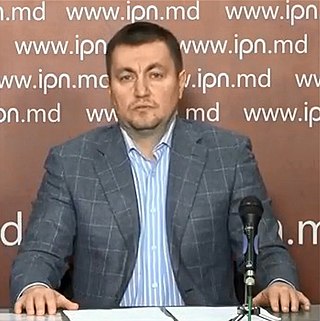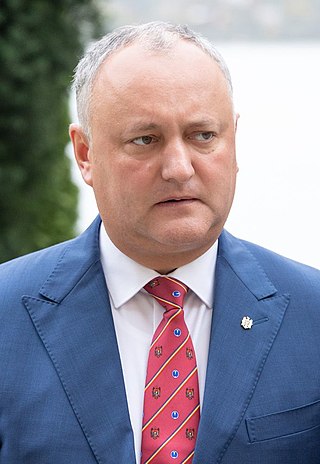Related Research Articles

The politics of Moldova take place in a framework of a parliamentary representative democratic republic, wherein the prime minister is the head of the Government of Moldova, and a multi-party system. The President of Moldova has no important powers. The government exercises executive power while the legislative power is vested in the Parliament. The judiciary is independent of the executive and the legislature. The position of the breakaway region of Transnistria, relations with Romania and with Russia, and integration into the EU dominate political discussions.
Telecommunications in Moldova are maintained at a relatively high performance level. Because Moldova is a small country, telecommunications companies managed to achieve good coverage in both wired and wireless communications infrastructure. Landline is available in most settlements, however mobile phone popularity has vastly increased in recent years. Mobile communications infrastructures are fairly well developed but suffer from high prices, nonetheless the amount of mobile subscriptions is growing very fast compared to the landline. As far as the Internet is concerned, Moldova has one of the best wired Internet connections in the world as well as one of the cheapest in $ per Mbit.

Transnistria, officially known as the Pridnestrovian Moldavian Republic and locally as Pridnestrovie, is a landlocked breakaway state internationally recognized as part of Moldova. It controls most of the narrow strip of land between the Dniester river and the Moldova–Ukraine border, as well as some land on the other side of the river's bank. Its capital and largest city is Tiraspol. Transnistria is officially designated by the Republic of Moldova as the Administrative-Territorial Units of the Left Bank of the Dniester or as Stînga Nistrului.

Vladimir Voronin is a Moldovan politician. He was the third President of Moldova from 2001 until 2009 and has been the leader of the Party of Communists of Moldova (PCRM) since 1994. He was Europe's first democratically elected communist party head of state after the dissolution of the Eastern Bloc.

Gagauzia or Gagauz-Yeri, officially the Autonomous Territorial Unit of Gagauzia (ATUG), is an autonomous territorial unit of Moldova. Its autonomy is intended for the local Gagauz people, a Turkic-speaking, primarily Orthodox Christian ethnic group.
The mass media of Transnistria, the breakaway territory within the borders of Moldova, features both state-owned or supported outlets and opposition media. Publications are in Russian, with a single newspaper in each of the other two official languages, Moldovan (Romanian), and Ukrainian.

The mass media in Moldova refers to mass media outlets based in the Republic of Moldova. Television, magazines, and newspapers are all operated by both state-owned and for-profit corporations which depend on advertising, subscription, and other sales-related revenues. The Constitution of Moldova guarantees freedom of speech. As a country in transition, Moldova's media system is under transformation.

The following is timeline of the History of independent Moldova which started after the independence of Moldova.

Publika TV was a Moldovan broadcast news television station. It was launched on April 7, 2010, their founders being the Romanian businessman Sorin Ovidiu Vîntu and the Moldovan businessman Vladimir Plahotniuc.
Ion Butmalai was a Moldovan politician and a deputy in the Parliament of Moldova from 2009 to 2014, member of the Liberal Democratic Party of Moldova.

Veaceslav Platon is a Moldovan businessman and former member of the Parliament of Moldova from 2009 to 2010. He also holds Russian citizenship.

Petru Bogatu was a journalist, essayist, political analyst and writer from the Republic of Moldova, unionist and pro-occidental orientation, editorialist at the National Newspaper, professor at the State University of Moldova, Faculty of Journalism and Communication Sciences.

Igor Dodon is a Moldovan politician who served as the 5th president of Moldova from 2016 to 2020. He currently serves as the leader of the Party of Socialists of the Republic of Moldova since 2024. He served as Minister of Economy and Trade in the governments of Vasile Tarlev and Zinaida Greceanîi from September 2006 to September 2009 and was a member of the Parliament of Moldova from 2009 to 2016. He lost his bid for re-election in 2020 to Maia Sandu, whom he had defeated four years earlier in the 2016 Moldovan presidential election.

Vladimir Plahotniuc, commonly referred to as Vlad Plahotniuc, is a Moldovan politician and oligarch and the vice president of the parliament of Moldova in 2010-2013. He was the chairman of the Democratic Party of Moldova and previously was a member of the Parliament of Moldova for three terms, and served as First Vice President of the Parliament of Moldova. Until leaving the territory of the Republic of Moldova in 2019, he was considered to be the powerhouse of Moldovan politics in matters of influence, controlling Moldova's government and parliamentary majority. Since fleeing Moldova in June 2019, Plahotniuc has resided in Turkey.
Events in the year 2014 in Moldova.

Prime is a Moldovan generalist television channel. The channel is distributed via DVB-T2, by the cable and IPTV operators in Moldova and broadcasts through analogue terrestrial television at a national level. Until 2019, it also retransmitted programs from Channel One Russia.

Andrei Năstase is a Moldovan politician who served as Deputy Prime Minister and Minister of Internal Affairs from 8 June 2019 to 12 November 2019. He was also a member of Parliament of Moldova in 2019. Năstase was the leader of the Dignity and Truth Platform from 2015 to 2021.
The First Transnistrian or First Pridnestrovian, also known as TV PMR, is a public television channel from Transnistria, an unrecognized republic internationally recognized as part of Moldova. It began broadcasting on 9 August 1992 and is available in the Moldovan (Romanian), Russian and Ukrainian languages. It was established by the Government of Transnistria and the Supreme Council to replace Moldovan media that allegedly spread "distorted facts" and "blocked the transmission of reliable information about events in the region".

Inna Șupac is a Moldovan civil activist and former politician who served as a member of the Moldovan Parliament for 10 years.

On 18 September 2022, protests in Moldova began in the capital city of Chișinău, demanding the resignation of the country's pro-Western government, amid an energy crisis causing rising natural gas prices and inflation, caused in part by the Russian invasion of Ukraine.
References
- ↑ "Local elections in Moldova: new votes, old disinformation narratives". 17 November 2023.
- 1 2 3 4 "Republica Moldova suspendă posturi TV și site-uri proruse, inclusiv stațiile lui Șor și Plahotniuc, pe perioada stării de urgență". 30 October 2023.
- 1 2 3 "Moldova blocks more Russian media outlets". 31 October 2023.
- ↑ "Moldova suspends six TV channels over Russia-Ukraine war coverage". 17 December 2022.